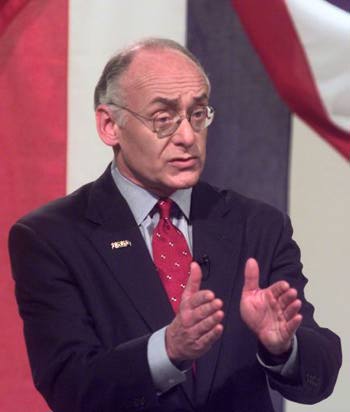Lee Fisher
-- former Ohio attorney general
and 1998 Democratic candidate for governor
and 1998 Democratic candidate for governor
 DDN photo by Eustacio Humphrey | Democrat Lee I. Fisher, Ohio attorney general from 1990 to 1994, was the Democratic candidate for governor in 1998, losing to Republican Bob Taft. Fisher had been a rising star in the Ohio Democratic Party since his first term in the Ohio House in 1980-82. After a single term in the House, Fisher was elected to the Ohio Senate where he served eight years before being elected attorney general in a landslide victory over Paul Pfeifer in 1990 But in 1994, Fisher was defeated for re-election by Republican Betty Montgomery, who campaigned as a tough crime-fighter and benefited from the national GOP landslide of that year. But Fisher bounced back, raising more than $1 million for a run for governor. His only Democratic opponent, Bruce Douglas, withdrew before the primary. In the general election Fisher lost to Taft. |
A graduate of Case Western Reserve Law School, Fisher gravitated to the judiciary committee.
During the Richard Celeste administration, Fisher became a point person for Celeste in the legislature,defending the Democrats' 1983 income tax increase and helping deflect criticism regarding ethics violationsin the Celeste administration.
Fisher also became a legislative leader on crime issues. He sponsored Ohio's crime victims' compensationlaw, the missing-children law and the hate-crime law.
Fisher made a successful bid for the office ofAttorney General in 1990. His defeat of fellow Sen. Paul Pfeifer by 1,234 votes out of more than 3 millioncast earned him the nickname "Landslide Lee."
| BORN: Aug. 7, 1951 EDUCATION: Oberlin College; Case Western Reserve Law School. PUBLIC SERVICE: State representative 1980-82; state senator, 1982-90; state attorney general 1990-94. PRIVATE BUSINESS: Law practice in Cleveland and Columbus. FAMILY: Married to Peggy Zone Fisher, two children, Jason and Jessica. |
Shortly before he left office, Celeste had used his powers as the state's chief executive to grant clemency tonumerous death-row inmates. Celeste was not a supporter of the death penalty and his then-wife, Dagmar,was a strong opponent of capital punishment.
Fisher, who had become a death-penalty proponent several years before running for attorney general,challenged Celeste's action in court, arguing that the clemency was not properly granted. Fisher lost in courtand angered a number of fellow Democrats who either opposed the death penalty or were strong Celestesupporters.
Fisher also gained enemies within the party when, after numerous news reports of ethical lapses in the officeof former state Auditor Tom Ferguson, he appointed a special prosecutor to investigate. That probe resultedin Ferguson, a Democrat, being convicted of ethics violations.
Despite Ferguson's conviction - and the belief by many Democrats that Fisher did the right thing -Ferguson's allies vowed to block Fisher's ascent within the party.
However, the greatest damage to Fisher's drive to be governor came in November 1994 when RepublicanBetty Montgomery, a former county prosecutor and state senator, denied him a second term as attorneygeneral. Montgomery was helped by the Republican landslide of 1994, but she also defined the campaign aswho would be the best crime fighter, even though most of the attorney general's duties are in the area ofcivil law.
The loss broke a string of election victories thatstretched to 1962, when he became student council president at his elementary school in the Clevelandsuburb of Shaker Heights.
After his defeat, Fisher returned to Cleveland to practice law, but soon began quitely raising money for another campaign.
On Sept. 4, 1997 Fisher announced his candidacy for governor. Initially he faced a challenger, Toledo businessman Bruce Douglas, but on April 8, 1998 Douglas withrew.
Selected Dayton Daily News stories:
LEE FISHER BETTER CHOICE FOR OHIO ATTORNEYGENERAL
Published: Tuesday, October 4, 1994 Page: 6A
OHIO HISTORY IN MAKING IN ATTORNEY GENERAL'SRACE
Published: Wednesday, November 9, 1994 Page: 6AA
By Christopher Davey COLUMBUS BUREAU
FISHER DELAYS DECISION ABOUT CAREER
Published: Monday, January 2, 1995 Page: 2B
OHIO POLITICS
FISHER ENTERS RACE FOR GOVERNOR
* The ex-attorney general's campaign will focus on kids and education.
Published: Friday, September 5, 1997 Page: 4B
By Debra Jasper COLUMBUS BUREAU
POLITICS
FISHER CHOOSES RUNNING MATE
* The former attorney general picks the Columbus City Council president.
Published: Tuesday, February 10, 1998 Page: 3B
By Tim Miller Columbus Bureau
PROFILE
FISHER'S EXPERIENCE FRAMES HIS AMBITION
* Fisher's drive led some to label him overly aggressive and sometimesarrogant
Published: Sunday, March 29, 1998 Page: 3B
By Tim Miller COLUMBUS BUREAU
Click below to generate a search on the Dayton Daily News library for more stories on Lee Fisher |